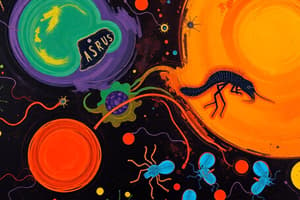Podcast
Questions and Answers
What occurs during the initial infection stage of the Plasmodium life cycle?
What occurs during the initial infection stage of the Plasmodium life cycle?
- Merozoites invade liver cells.
- Gametes fuse to form a zygote.
- Sporozoites are injected into the human bloodstream. (correct)
- Oocysts develop in the mosquito's midgut.
Which stage of the Plasmodium life cycle occurs in the liver and does not cause symptoms?
Which stage of the Plasmodium life cycle occurs in the liver and does not cause symptoms?
- Blood Stage
- Initial Infection
- Liver Stage (Exoerythrocytic Schizogony) (correct)
- Differentiation of Merozoites
What is the role of merozoites in the Plasmodium life cycle?
What is the role of merozoites in the Plasmodium life cycle?
- They fuse to form gametocytes in the gut.
- They develop into sporozoites in the mosquito salivary glands.
- They multiply in the mosquito's gut as ookinetes.
- They cause symptoms of malaria by invading red blood cells. (correct)
In which stage do gametocytes become critical for the life cycle of Plasmodium?
In which stage do gametocytes become critical for the life cycle of Plasmodium?
What is formed when male and female gametocytes fuse inside the mosquito's gut?
What is formed when male and female gametocytes fuse inside the mosquito's gut?
Which process occurs after the zygote develops in the mosquito's gut?
Which process occurs after the zygote develops in the mosquito's gut?
What triggers the transmission of Plasmodium to a new human host?
What triggers the transmission of Plasmodium to a new human host?
What role do merozoites play in the symptoms observed in malaria patients?
What role do merozoites play in the symptoms observed in malaria patients?
Flashcards
Initial Infection
Initial Infection
The stage of the Plasmodium life cycle where sporozoites infect the human host.
Liver Stage (Exoerythrocytic Schizogony)
Liver Stage (Exoerythrocytic Schizogony)
The stage where sporozoites multiply asexually in liver cells.
Blood Stage (Erythrocytic Schizogony)
Blood Stage (Erythrocytic Schizogony)
The stage where merozoites invade red blood cells and multiply asexually, causing symptoms of malaria.
Gametocytes
Gametocytes
Signup and view all the flashcards
Gametocytes Fusion
Gametocytes Fusion
Signup and view all the flashcards
Ookinete
Ookinete
Signup and view all the flashcards
Oocyst
Oocyst
Signup and view all the flashcards
Sporozoite Production
Sporozoite Production
Signup and view all the flashcards
Study Notes
Plasmodium Life Cycle Overview
- The Plasmodium parasite, responsible for malaria, has a complex life cycle involving both a mosquito vector and a human host.
- This cycle involves asexual reproduction in the human host and sexual reproduction in the mosquito vector.
- The parasite's multiplication within the human host causes the symptoms of malaria, including fever, chills, and anemia.
Stages in the Human Host
- Initial Infection: The anopheles mosquito injects sporozoites (infective stage) into the human bloodstream during a blood meal.
- Liver Stage (Exoerythrocytic Schizogony): Sporozoites travel to the liver cells, where they develop into merozoites, multiplying asexually. This stage is asymptomatic.
- Blood Stage (Erythrocytic Schizogony): Merozoites invade red blood cells, multiplying asexually within them. This is the stage that causes symptoms of malaria.
- Differentiation of Merozoites: Some merozoites differentiate into gametocytes, crucial for the sexual stage in the mosquito.
- Infective Cells for the Mosquito: Gametocytes are ingested by a blood-feeding anopheles mosquito.
Stages in the Mosquito Host
- Gametocytes Fusion: Male and female gametocytes fuse to form a zygote inside the mosquito's gut.
- Ookinete Formation: The zygote develops into an ookinete, penetrating the mosquito's gut wall.
- Oocyst Development: The ookinete develops into an oocyst, where the parasite multiplies asexually within the mosquito's midgut wall.
- Sporozoite Production: Thousands of sporozoites develop within the oocyst and migrate to the mosquito's salivary glands.
- Transmission to a New Host: The infected mosquito transmits sporozoites to a new human host during a blood meal.
Important Points
- The cycle relies on both humans and mosquitoes. Each host plays a vital role in the parasite's life cycle.
- The liver and red blood cell stages within the human host are crucial in causing the disease.
- Malaria symptoms arise from merozoite multiplication in red blood cells, releasing cellular components into the blood.
- Diagnosis and treatment aim to stop or eliminate the parasite at various stages.
- Control strategies often target the mosquito vector.
Key Parasite Forms
- Sporozoites: Infective stage, in mosquito saliva.
- Merozoites: Asexual forms, infecting red blood cells.
- Gametocytes: Specialized cells for sexual reproduction in the mosquito.
- Ookinete: Motile zygote form.
- Oocyst: Cyst-like structure in the mosquito gut, where sporozoites develop.
Studying That Suits You
Use AI to generate personalized quizzes and flashcards to suit your learning preferences.




